As any foreign policy practitioner in Washington will tell you, keeping Africa high on the list of priority issues is no small task.
But walking into Mining Indaba in South Africa earlier this year, the vibe was different. The eleven thousand attendees—representing governments, multilateral organizations, companies, civil society organizations, and nonprofits focused on mining—clearly see the urgency of focusing on Africa, in part because of the continent’s mineral deposits.
Trump’s second administration has made clear in its opening weeks that securing access to minerals is a top priority. Countries worldwide have taken notice: For example, Ukraine has agreed to sign a minerals deal with the United States to help with peace negotiations with Russia. African governments have moved US critical-minerals investment to the top of their foreign policy agendas, most clearly demonstrated by the Democratic Republic of the Congo’s offer to grant the United States exclusive access to its minerals in exchange for security assistance.
Seeing that the Trump administration is prioritizing securing access to minerals, it must also prioritize Africa. Making this case in Washington is quite complicated, as too often, issues regarding “Africa” or labeled “African” are muffled by issues perceived as higher priority to policymakers. However, securing access to these minerals is an urgent national security issue; the United States thus must view investments in African energy, minerals, and mining with similar importance.
It is clear that African governments and communities view the current scramble for Africa’s minerals with an appropriate amount of urgency. During the opening ceremony, South African Minister of Mineral Resources and Energy Gwede Mantashe said “Look around,” gesturing to the thousands of people on the trade show floor. “Everyone is looking at Africa!” As Kgosi Seatlholo, chairperson of the National House of Traditional and Khoi-San Leaders, said during the opening ceremony, “our communities know that Africa has what the world wants.”
Yet African governments can also do more to help push the continent higher on the US list of priorities. I, and others at the Atlantic Council’s Africa Center, hear regularly from African government officials that they must carefully navigate the need for access to mineral assets by heavily industrialized and developed economies and the need to finance their own government expenditures, including their own development plans. While African countries may seek to move higher up the value chain, away from solely extracting minerals and toward hosting projects to refine them, they should not wait to green-light projects in search of better deals or additional greenfield investments in extraction, refining, recycling, or other midstream operations. Meanwhile, African governments should take steps that attract more urgently needed investment: for example, reducing administrative and bureaucratic barriers for investors and considering subsidies for labor or key utilities at notoriously energy- and water-intensive mining sites. Such steps can get projects, which often have ten- to fifteen-year returns on investment, moving along quickly. They can also help future-proof projects.
Financial institutions also have a key role to play. From private equity and venture capital firms to hedge funds and banks, financial institutions are critical to unlocking the full potential of Africa’s massive mineral endowment and supplying the huge amount of minerals needed for the energy transition. Smart investments are critically needed in processing and manufacturing, training the next generation of mining engineers, and launching new technologies that provide more information for decision-making, mapping mineral deposits, and making mineral projects safer.
More can also be done to raise Africa higher on the list of priorities on the business side. The United States and other Western governments seeking access to Africa’s rich mineral deposits must do more to identify projects, facilitate transactions—including business matchmaking, if necessary—and provide risk guarantees or project insurance. As Washington continues to make significant reforms, policymakers should seize the moment to quickly advance minerals-related projects that help achieve US national economic security goals. As the administration continues to have discussions about agencies such as the US International Development Finance Corporation and the Export-Import Bank of the United States, and also about a potential US Sovereign Wealth Fund, Washington must use these tools to help the private sector reduce barriers to investment in Africa’s critical mineral projects. US government agencies should expedite the approval process to compete with foreign competitors, including China’s policy banks and commercial creditors.
To advance discussions about investment challenges in African critical-mineral projects and shape policies that support critical-minerals security for the United States and other Western countries, the Atlantic Council’s Africa Center launched its Critical Minerals Task Force at Mining Indaba 2024. The Task Force not only brings together the public and private sectors in conversation about the African mining space; it also analyzes models for mineral development and recommends policies to encourage investment. We strive to tailor our recommendations for African and Western governments to limit barriers to investment in the mining sector, reduce supply chain dependence on China, and encourage policy outcomes that support critical minerals security for the United States and other Western countries.
Africa’s mineral deposits are not just a resource but a strategic asset that can shape the future of security, energy, and economic development worldwide. For example, as upcoming Africa Center analysis will cover, Africa’s critical minerals play a role in US national defense. The United States has an expanding opportunity to further secure its future by prioritizing investment in Africa’s critical mineral sector; the Trump administration must take it.
Benjamin Mossberg is the deputy director of the Atlantic Council’s Africa Center.
Further reading
Fri, Mar 21, 2025
In the scramble for Africa’s critical minerals, the West must not abandon the ESG agenda
AfricaSource By
As this race for minerals and metals critical for the energy transition heats up, both companies and governments must not abandon environmental, social, and governance principles in Africa.
Fri, Jun 7, 2024
Increasing investment in African mining should be a higher priority for the United States
AfricaSource By Aubrey Hruby
If governments, investors, and development partners don’t make dramatic changes in the next five years, the United States will fail to counter Chinese influence in supply chains.
Mon, Mar 18, 2024
The critical-minerals boom is here. Can Africa take advantage?
AfricaSource By Alexander Tripp
The critical minerals discussion on extraction, national security, and supply chains will move past Africa unless the moment is seized.
Image: Critical Minerals Task Force private roundtable at Mining Indaba 2025 in Cape Town, South Africa. Photo courtesy of Benjamin Mossberg.



